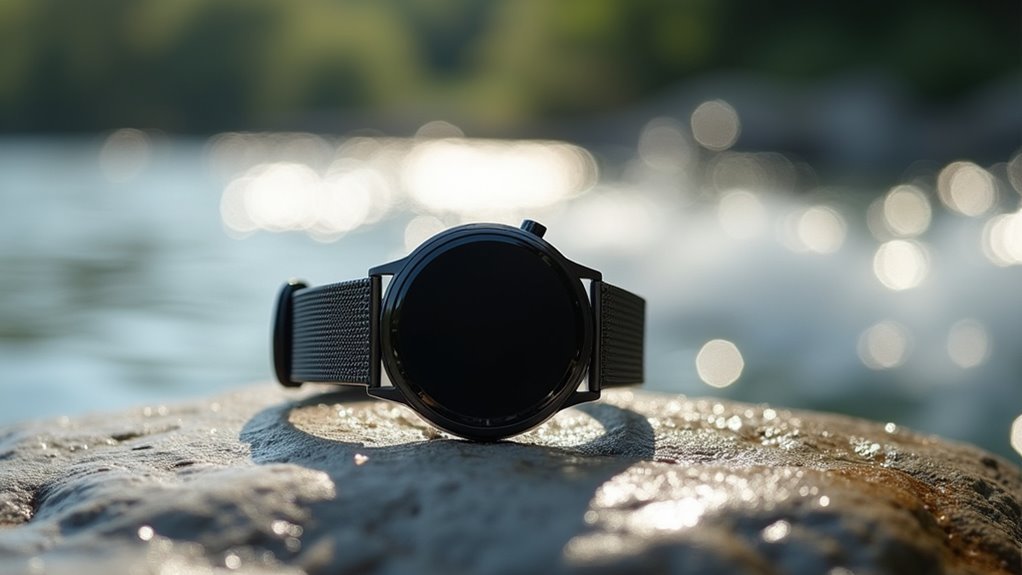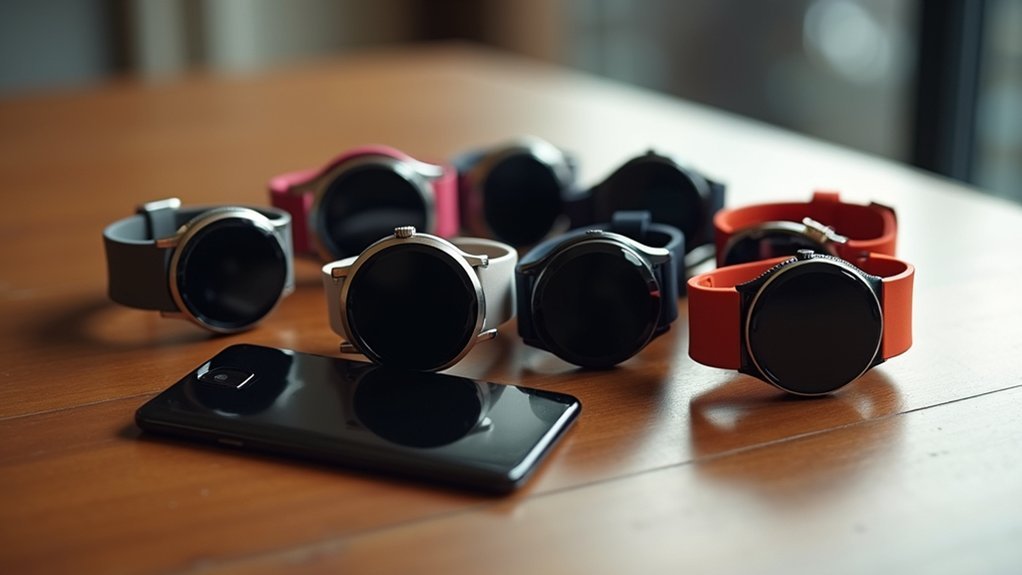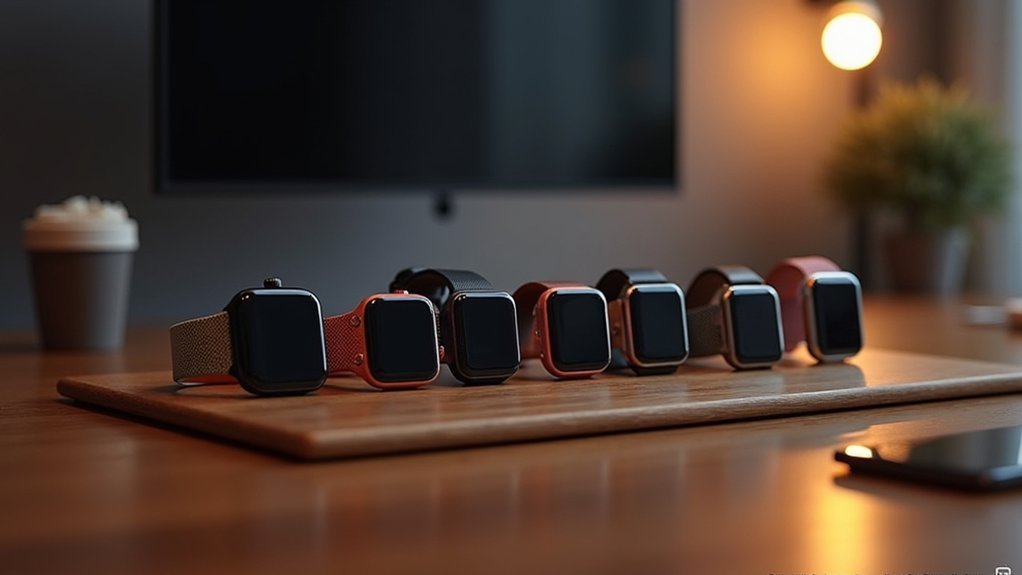You’ll find excellent ECG heart monitoring in waterproof smartwatches like the Apple Watch Series 10 and Ultra 2, Samsung Galaxy Watch 7, Garmin Venu 3 and Fenix 8, Fitbit Sense 2, and Huawei Watch 5 series. These devices offer 5-10 ATM water resistance with IP68 protection, making them perfect for swimming while tracking your heart’s electrical activity. They sync ECG data with health apps and detect irregular rhythms automatically. Regional availability varies due to regulatory approvals, and there’s much more to discover about their capabilities.
Top ECG-Enabled Waterproof Smartwatch Models

The market for ECG-enabled waterproof smartwatches has expanded greatly, with major tech companies now offering sophisticated heart monitoring capabilities in water-resistant designs.
Major tech companies have revolutionized wearable technology by integrating advanced heart monitoring with robust waterproof designs for active users.
You’ll find the Apple Watch Series 10 and Ultra 2 leading the pack with ceramic heart rate monitors and rugged construction perfect for water activities.
Samsung’s Galaxy Watch 7 delivers ECG functionality approved across the US, Europe, and South Korea.
Garmin’s Venu 3 and Fenix 8 provide innovative ECG apps alongside exceptional durability. The Venu 3 supports voice assistants via smartphone connection and offers over a week of battery life with its AMOLED display.
The Fitbit Sense 2 mirrors Apple’s wellness-focused approach while maintaining water resistance.
Huawei’s Watch 5 and GT 5 Pro round out your options with extensive health monitoring that doesn’t compromise on waterproof performance.
Water Resistance Ratings for ECG Monitoring Devices
When you’re evaluating these top ECG smartwatch models, understanding their water resistance ratings becomes paramount for making an informed purchase decision.
You’ll encounter ATM (atmospheres) or meter ratings that indicate pressure or depth tolerance underwater. For swimming with ECG devices, you need at least 5 ATM or 50m rating – anything less like 3 ATM only offers splash resistance.
IP ratings, particularly IP68, complement ATM ratings by showing dust and water ingress protection.
When you see IP68 combined with 5 ATM, you’re getting extensive water durability. Higher ratings like 10 ATM provide better protection for vigorous swimming. For specialized diving activities, look for devices with EN13319 certification along with 10 ATM ratings to ensure proper underwater performance.
Advanced Health Tracking Features Beyond ECG

While ECG functionality represents the cornerstone of cardiac monitoring in waterproof smartwatches, today’s advanced devices extend far beyond basic heart rhythm detection to deliver thorough health insights.
You’ll find continuous heart rate variability tracking that assesses your stress and recovery status, while SpO2 sensors monitor blood oxygen saturation to evaluate respiratory function. Multi-sensor integration combines accelerometers, gyroscopes, and skin conductance sensors to create detailed health profiles correlating cardiovascular data with physical activity and stress levels.
These watches provide 24/7 sleep tracking with REM, deep, and light sleep stages, plus AI-driven recovery metrics that inform ideal exercise intensity. Modern devices support comprehensive fitness monitoring with 110+ sports modes covering everything from swimming and cycling to specialized athletic activities.
You’ll benefit from activity-specific monitoring during swimming, running, and cycling, with real-time heart rate zones and VO2 max estimates enhancing performance insights.
Health App Integration and Data Management
Seamless connectivity between your waterproof ECG watch and dedicated health applications transforms raw cardiac data into actionable health insights through sophisticated data management systems.
You’ll find compatibility with popular platforms like Fitbit, Samsung Health, and Huawei Health, enabling cross-platform data access across Android and iOS devices. These apps display detailed ECG graphs while detecting irregular rhythms like atrial fibrillation, automatically alerting you to potential concerns.
Your data syncs automatically with smartphones and tablets, creating thorough health timelines you can share with healthcare professionals. Apps feature intuitive dashboards with customizable settings, search filters, and symptom logging capabilities. Healthcare providers can receive direct ECG recordings, enabling more efficient AFib management and improved diagnostic accuracy during clinical consultations.
Automatic synchronization creates comprehensive health records that healthcare providers can easily access and review for better patient care.
Security remains paramount through encryption protocols, HIPAA compliance standards, and clear data retention policies. You’ll also benefit from export options for personal records and emergency contact notifications when irregularities occur.
Battery Performance and Regional Availability Considerations

Battery life becomes a critical factor when selecting waterproof ECG watches, as these dual-capability devices face unique power demands from continuous health monitoring and water-resistance features.
You’ll find the Withings ScanWatch 2 leads with 30 days battery life, while Garmin’s Fenix 8 offers up to 29 days in smartwatch mode. Apple Watch Ultra 2 provides 36 hours standard use, and Fitbit Sense 2 delivers up to 6 days.
However, you must verify ECG availability in your region before purchasing. The US and EU typically support ECG functionality, but Asia-Pacific markets often lack this feature due to regulatory restrictions.
Regional firmware differences can disable ECG monitoring entirely, making location-based research essential for your buying decision. Many waterproof ECG watches now incorporate solar technology to extend battery performance during outdoor activities and water sports.
Frequently Asked Questions
Can I Wear My ECG Watch During Medical Procedures Like MRI Scans?
You can’t wear your ECG watch during MRI scans. The metal components and electronics create safety hazards and interference risks. You’ll need to remove all electronic devices before any MRI procedure.
How Accurate Are Smartwatch ECG Readings Compared to Hospital Equipment?
Your smartwatch ECG isn’t as accurate as hospital equipment. While Apple Watch shows 98.5% sensitivity for AFib detection, it can’t match 12-lead hospital systems that capture extensive heart activity.
Will My ECG Watch Interfere With Pacemakers or Other Medical Devices?
ECG watches typically don’t interfere with pacemakers, but you should consult your healthcare provider first. Keep the watch away from your implant site and follow manufacturer guidelines for safe use.
Can ECG Watches Detect Heart Attacks or Other Serious Cardiac Emergencies?
ECG watches can detect heart attacks with 93-95% accuracy, but they’re not perfect diagnostic tools. They’ll help with early detection and monitoring, though they can’t replace hospital-grade equipment for thorough cardiac emergency diagnosis.
Do I Need a Prescription or Doctor Approval to Use ECG Features?
You don’t need a prescription or doctor approval to use ECG features on waterproof watches. However, you should consult your doctor to properly interpret results, especially if you’ve got pre-existing heart conditions.
In Summary
You’ll find excellent ECG-enabled waterproof smartwatch options that don’t compromise on health monitoring capabilities. Whether you’re swimming, showering, or caught in rain, these devices maintain accurate heart rhythm tracking while offering extensive health features. You can seamlessly sync your data across platforms, monitor your cardiovascular health around the clock, and enjoy extended battery life. Choose models with proper water resistance ratings that match your lifestyle and regional availability requirements.





Leave a Reply